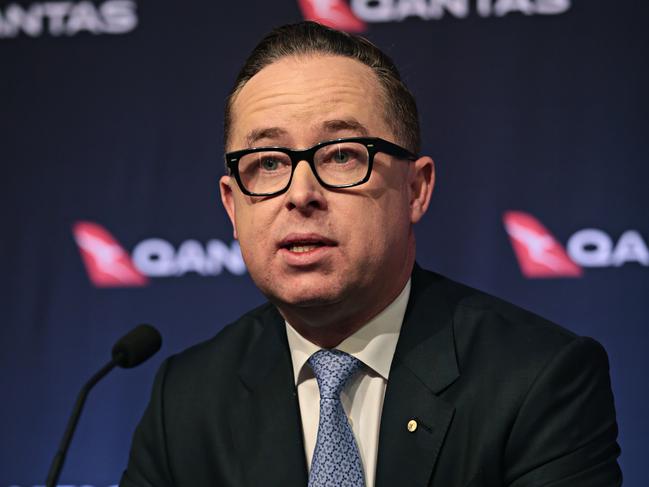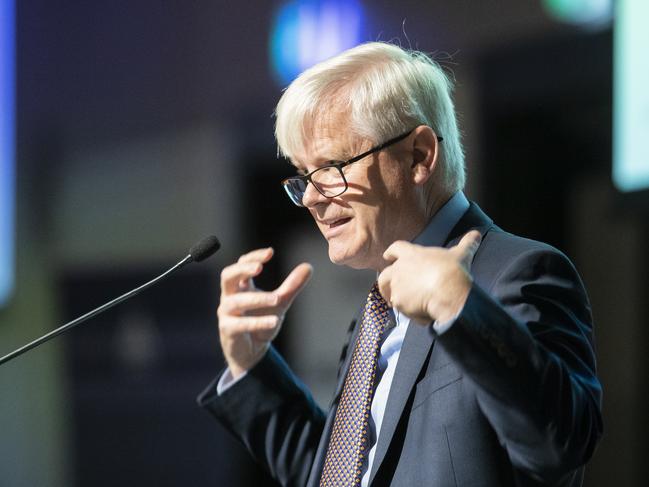How coronavirus will hurt us the most
Containing the spread of coronavirus is one thing – but there’s no stopping the outbreak’s economic fallout. From product shortages to industry bailouts, here’s where it’s going to hurt.
Economy
Don't miss out on the headlines from Economy. Followed categories will be added to My News.
- Aussies reject ‘tax holiday’ amid fire, coronavirus fallout
- What the last recession in Australia was really like
Australian government efforts to contain the spread of the deadly coronavirus have been remarkably successful to date.
But experts warn there will be no quarantine from the outbreak’s economic wallop, which will be felt across a range of industries.
The coronavirus emergency has revealed just how enmeshed the Australian and Chinese economies have become.
The world’s most populous nation is also the top customer for Australia’s top three export industries: iron ore, coal and tourism.

Numbers of Chinese tourists to Australia neatly illustrate how quickly things have changed.
In 2008/9, 353,000 Chinese tourists came to Australia – but a decade later, that number had more than quadrupled to 1.5 million.
China overtook New Zealand as our biggest source of annual visitors two years ago – but with the federal government extending its ban on visitors from China for another week, our $44 billion tourism industry is set for a big hit.
TOURISM IN TROUBLE
Tourism operators say they are not expecting any recovery from the coronavirus effect until at least July.
Notes of a recent meeting of Australian Tourism Export Council members show industry operators are already receiving cancellations through to early April, and they’re not just coming from China. Operators also reported cancellations come from Korea, Japan, Singapore, Malaysia and Indonesia.
“Impacts will be longer than originally thought as May and June are traditionally softer months for China, so any recovery is unlikely until at least July,” the notes of the ATEC meeting state.

Qantas announced this week that it was suspending its Sydney-Shanghai service until the end of May – possibly longer – and was reducing capacity across all of Asia by 15 per cent in the same period.
“We have a lot of flexibility in how we respond,” Qantas CEO Alan Joyce said. “We can extend these cuts, cut deeper if we need to, or add capacity back in. Maintaining our strategic position is also key. We know demand into Asia – particularly, China – will rebound, and we’ll be able to ramp up when it does.”
Earlier this month Virgin Australia announced it was axing its Sydney-Hong Kong route, citing declining demand in the wake of civil unrest and coronavirus concerns.
Last week the Australian Tourism Industry Council Executive Director Simon Westaway said the closure of the Chinese inbound travel market represented $1 billion in lost spending.
NERVOUS WATCH FOR EDUCATION SECTOR
Tertiary education has been one of the industries most severely impacted by the outbreak, with as many as 250,000 Chinese students prevented from starting their studies for the year because of the travel ban.
Universities Australia Chief Executive Catriona Jackson told News Corp that “there is absolutely no doubt there will be a financial impact, not just to Australian universities but also to the Australian economy”.
While she had no data on the exact losses to date, she said the sector was “absolutely supportive” of the travel bans and the heath of the community was always the primary concern.
Universities had made contact with virtually every affected student and were offering options including studying in different locations, fee deferrals and waivers, she said.

Ms Jackson confirmed the sector was in discussions with the federal government about industry assistance, although she declined to go into details.
Competitor markets for higher education such as the UK and Canada have not imposed the same sorts of bans as Australia has, prompting the question: could those restrictions make Australia seem like a less attractive place for Chinese students to study in future?
“Nothing about Australia has changed in the past four or five weeks,” Ms Jackson said. “We are doing everything we can to make sure there’s not a reputational hit.”
Chinese diplomats in Australia have accused Canberra of overreacting to coronavirus, and this
week Consul-General Gu Xiaojie said the bans could have a long-term impact on our tertiary education industry.

Professor James Laurenceson from the Australia-China Relations Institute at Sydney’s University of Technology said similar sentiments were also being pushed through Chinese state media, “but of course the average Chinese person doesn’t believe everything they read in state media”.
“We need to be conscious of that, but I also think Chinese students are pretty pragmatic. They value an Australian education. We shouldn’t overreact,” he said.
“I wouldn’t be too concerned necessarily about what the Chinese ambassador is saying. I’m not saying we should dismiss it but we don’t need to get hung up on it. What we really need to be focused on is making sure that Chinese tourists and students are still welcome. That’s the big challenge for us.”
CONSUMER PRODUCT SHORTAGES
From fruit packaging to vapes to car components and electrical goods, the shutdown of Chinese factories will affect Australian consumers and retailers in a myriad of ways.
The National Retail Association said businesses exposed to the “coronavirus effect” were reporting sales downturns by as much as 60 per cent.
A spokeswoman for Coles told News Corp that logistics remained challenging, especially getting goods out of the major ports of Shanghai and Tianjin.
“Products such as antibacterial handwashes and hand sanitiser products are already low in stock and there are shortages forecast for non-food items like stationery, clothing, electrical goods,” she said.

Related news:
Australian retailers call for ‘tax holiday’
Labor commits to zero emissions by 2050
Harsh reality of life in coronavirus quarantine
World reacts to Queensland family horror
“Coles has also experienced delays in refrigeration equipment being shipped out of China for our store renewals. We are keeping in close contact with affected suppliers, not just those in China but also local suppliers who source raw materials or packaging from China.”
Other major retailers were reluctant to discuss product shortages, with a spokesman from Woolworths stating that were “actively monitoring the unfolding situation in Asia”, but “at this stage, we haven’t seen any disruptions to supply or procurement across the group.”
Electrical and electronic items will be heavily impacted, with retailers such as Kogan and JB HiFi this week admitting there would be supply issues, although details were lacking.
Australia imported just over $13 billion worth of electrical goods from China in 2018, according to tradingeeconomics.com.
This week, Apple warned that iPhone supplies worldwide would be “temporarily constrained”. “While our iPhone manufacturing partner sites are located outside the Hubei province — and while all of these facilities have reopened — they are ramping up more slowly than we had anticipated,” a company spokesman said.
Brian Marlow from Legalise Vaping Australia warned that companies that specialised in the making of coils and wicks used in vaping products had been subject to the pause in manufacturing, and this would lead to some stocks being unavailable in Australian retailers over the next few weeks.
PROPERTY LOOKING FOR CHINA STIMULUS
Nerida Consibee, Chief Economist with realestate.com.au, said the SARS virus in 2004 actually had little impact on the Australian property market as a quarter of negative growth was followed by a by a stimulus push from Beijing.
“If a SARS type economic impact occurs [with coronavirus], then the impact on pricing will be quite minimal. It is unlikely that one quarter of economic decline in China, following by a big jump would result in a substantial loss of employment in Australia,” she said.

“If the impact was more severe and Australia’s unemployment rate started to rise rapidly, then this would be bad news for households and bad news for prices.”
Australia’s unemployment rate increased to 5.3 per cent this week, up from 5.1 per cent in January.
Search activity on realestate.com.au from Chinese property buyers was high in November and December but low in January, but it was unclear whether this was driven by the virus, Ms Consibee said.
OVERALL IMPACT
Chris Richardson from Access Economics said despite some “dire commentary” about the state of the economy, as well as weak consumer spending, a recession was not inevitable.
“Chances are the economic data will show the opening months of 2020 to be pretty modest,” he said. “The economy is under pressure but it’s not quite as weak as people think it is.”
Global prices for Australian commodities, especially iron ore, were “not at their peak, but not disastrous,” he said.
By way of example, the price for iron ore that was forecast for June 2020 in the government’s Mid Year Economic and Financial Outlook had already been exceeded, Mr Richardson said.
Asked about recent requests for federal financial assistance that had come from the tourism and retail sectors, Mr Richardson urged a touch of restraint.

“Governments should always help out in a crisis, but they need to be cautious. Government can’t step in too much and too often, because that’s not affordable or smart.”
Professor Laurenceson said China was on track for a “tough first quarter which spill over into the second, but in the second half of the year things will return to normal.”
The fundamentals of the economic relationship between Australia and China would stay strong, he said.
“Chinese tourists want to come to Australia; Chinese students want to study in Australia. Those drivers won’t disappear,” Prof Laurenceson said.
“The Chinese economy won’t collapse because of the virus. It’s going to have a tough first quarter but I expect it to bounce back. By the middle of the year the fundamental drivers of the economic relationship, whether it be tourism, education, agriculture or whatever … they will be starting to reassert themselves again.”
Originally published as How coronavirus will hurt us the most
